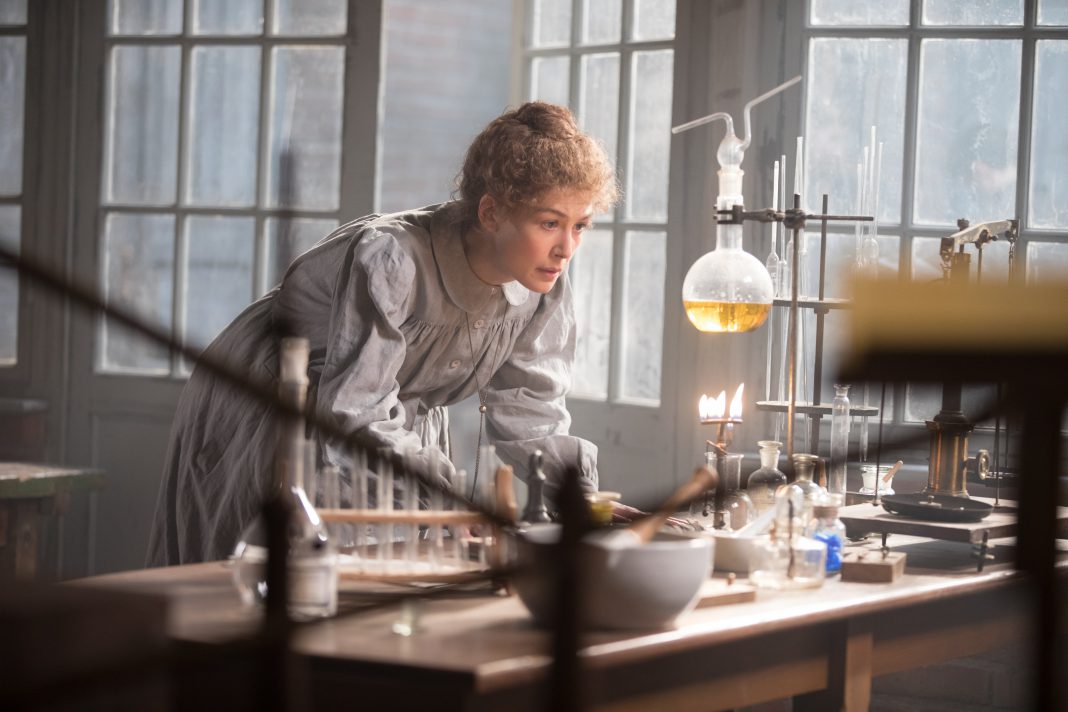Makers of biopics – dramatised film biographies – all ask themselves the same question: How closely should we stick to the facts? Makers of biopics about scientists have a harder question to ask: How do you make scientific research watchable? In her filmed life of Marie Curie coming soon to the Kino Rye, Iranian filmmaker Marjane Satrapi (Persepolis) comes up with some answers, some of which work, some of which don’t.
Satrapi’s film, Radioactivity, charts the life of Maria Skłodowska, later Marie Curie, from the death of her mother in 1878 when Curie was 10 to her own death in France in 1934. In the intervening years, Curie was awarded not one but two Nobel prizes, becoming the first woman to win the prize, the first person, man or woman, to win it twice, and the only person to win a Nobel in two different fields: physics and chemistry.
Along the way, she also became the first woman to hold a professorship at the University of Paris and the first to be entombed on her own merits in the Paris Panthéon along with other French giants – Voltaire, Hugo, and Simone Veil – and her husband, Pierre.
Late in Satrapi’s film, Curie and her daughter Irène (also a Nobel prize-winner played here by Anya Taylor-Joy) are seen driving out to the Western Front during the first world war. Curie (Rosamund Pike) says tartly: ‘You were a difficult daughter.’ Irène shoots back: ‘You were a difficult mother.’ Which, we are asked to believe from Jack Thorne’s script based on a graphic novel by Lauren Redniss, Curie was. Not just a difficult mother, he tells us, but a difficult wife, a difficult colleague, a difficult woman.
Earlier in the movie, the president of France’s prestigious Académie des sciences (Simon Russell Beale) brusquely denies Curie admission to the Académie. Curie pushes back. In case we don’t get what’s going on in the scene, the filmmaker telegraphs it to us: ‘Marie along with every other woman on the planet then and now has to stand up for herself in this male-dominated world.’ We get it.
(In real life, it was the same man, Professor Gabriel Lippmann, himself a Nobel laureate for his invention of colour photography, who gave Curie her first job, successfully presented her findings to the Académie, invented the electrometer that allowed Curie to discover her new elements, radium and polonium, and secured her her professorship.) There’s more telegraphing to come.
Satrapi and Thorne demonstrate Curie’s singular courage and determination in a plodding way by showing us, repeatedly, Curie shovelling pitchblende – tonnes of which were needed to produce a single gram of radium chloride. Same goes for the lab work with Pike staring fixedly into a beaker in shot after shot, in case we didn’t get that message first time around.
Satrapi and Thorne’s combined efforts aren’t helped by some of Thorne’s more leaden lines: ‘This could change science forever’ and ‘You just threw the stone in the pond; you’re not responsible for the ripples.’
The movie starts off slow and doesn’t pick up speed until all the men in Marie’s life are gone. Momentum is stalled again by Satrapi’s odd choice of inserting vignettes of future events – Hiroshima, nuclear tests in Nevada, Chernobyl – into her story. To show us how dangerous radioactivity can be in the wrong hands? We get that too – ripples on the pond.
It’s left to Pike (A Private War) to breathe life into the movie, beginning with a screen-grabbing tour-de-force beside (SPOILER ALERT) her husband’s coffin. Radioactivity dishes up a portrait of a woman who kept her emotions locked up tight until a man came along with a key.
That may work in a biopic; but it doesn’t ring true in the life of one of the greatest scientists the world has ever known, male or female. Leave the last word to Albert Einstein: ‘[Curie] was the only person who could not be corrupted by fame.’
Image Credits: StudioCanal http://www.studiocanalpress.co.uk/press/single/1985 .



